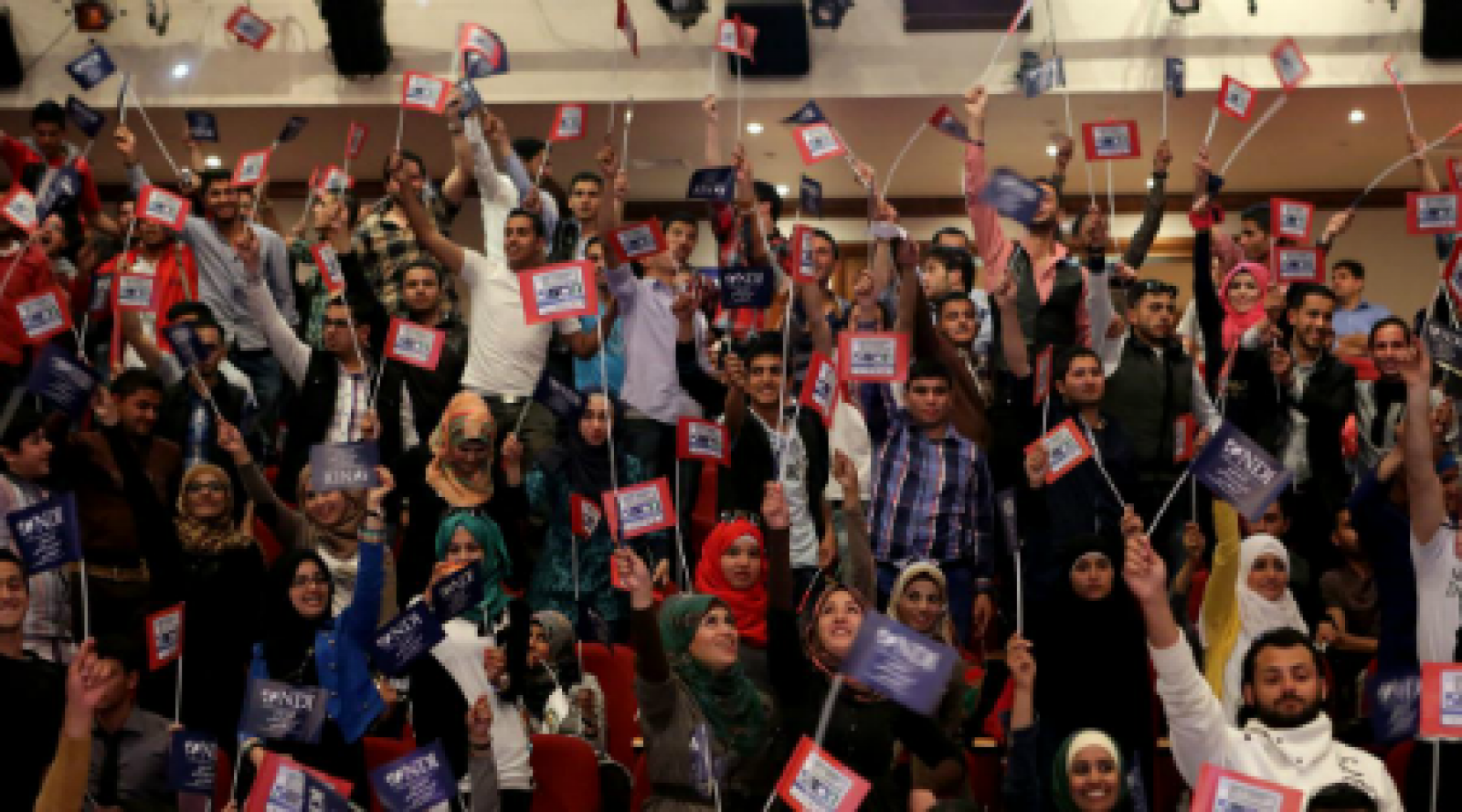
SHARE
More than 500 university students, deans, professors, government officials and civil society representatives packed into an auditorium at the University of Jordan to watch teams from 16 universities[1] compete in NDI’s third annual National Student Debate Competition.
The June 15, 2015 competition, covered by Roya TV, a popular Jordanian news channel, was among the culminating events for the 2014-2015 academic year of NDI’s youth political participation program, Ana Usharek (“I Participate”). Launched in 2011, Ana Usharek, and the Usharek+ advanced program, encourages Jordanian university students to become more active and informed citizens. The competition was first held in 2013, and marked Jordan’s first-ever national student debate competition.
In a nation where tribal affiliations—not political platforms—often figure most prominently at the ballot box, the Ana Usharek and Usharek+ programs have helped more than 9,000 of Jordan’s youngest generation of voters (and next generation of leaders) develop critical thinking and research skills, analyze local and national-level issues, and identify how elected representatives and government officials can best address those issues. The majority of the Jordanian population is under 35 years old.
Through group sessions led by experienced NDI youth coordinators, students learn about democratic concepts and discuss them in the context of Jordan’s ongoing political reform process. Top students advance to Usharek+, where they develop advocacy, communications and debate skills, and apply them by designing and launching their own advocacy campaigns. As one Usharek+ student explained, “We all have the capacity and motivation to serve our community and nation, but perhaps not the know-how; this is where Ana Usharek came in to clarify the role of civil society organizations in community service.”
During the debates, a panel of judges rated teams according to a strict scoresheet that awarded points based not only on how passionately positions were defended, but also on whether those positions were well thought out and backed up by facts.
Two weeks prior, teams were randomly assigned either the supporting or opposing position on one of eight topics, which ranged from internet censorship to political party and election reform. The students then researched their respective topics to develop arguments before convening for the debates. Teams from Jordan’s large, public universities dominated the competition, winning six out of eight spots in the quarter finals and three out of four spots in the semi-finals.
While NDI’s annual National Student Debate Competition allows students to showcase the skills and knowledge they gained through Ana Usharek and Usharek+, the benefits go far deeper than just trophies or bragging rights. The competition gives students a venue where they can discuss some of the nation’s most pressing challenges, and show that young Jordanians are not only interested in politics but also quite capable of engaging in high-level conversations on complex issues.
The debates also serve as a model for constructive, respectful dialogue as an alternative to the violent altercations that have plagued Jordanian universities in recent years. “Such debates contribute significantly to the awareness of young Jordanians through access to information and expressing [support] or opposition [to] public issues in a scientific manner rather than violence.” said Dr. Sakher Al Khasawneh, director of the Jordan Media Institute and one of the competition’s judges. “[They also] promote freedom of expression and opinion and consolidate the values of democracy based on participation and decision-making, which are crucial for active youth participation.”
Lastly, the debates—and NDI’s youth programming overall—help bridge the gap between young Jordanians and the political realm from which they have traditionally been marginalized by bringing articulate, politically minded university students together with some of the nation’s top decision-makers. Current and former parliamentarians, senators and senior government officials were among the judges and guests at the competition. These mutually beneficial interactions fit within NDI-Jordan’s broader program, which works with civil society, women’s organizations, legislators and their staff, and government ministries to help create political and electoral processes that are more transparent and involve citizens more heavily in decision-making.
Roya TV will air the National Student Debate Competition as individual episodes in their popular youth program “Caravan” starting this Fall.
Ana Usharek and Usharek+ are funded by the U.S. Agency for International Development's Consortium for Elections and Political Process Strengthening (CEPPS) program.
Published on Sept. 16, 2015.
[1] Participating universities included Al-Ahliyya Amman University, Al Albayt University, Al-Hussein Bin Talal University, Balqa Applied University, College of Polytechnics, Hashemite University, Irbid National University, Jadara University, Jordan University of Science and Technology, Mutah University, Philadelphia University, Princess Sumaya University for Technology, Tafila Technical University, University of Jordan, Yarmouk University and Zarqa University.


